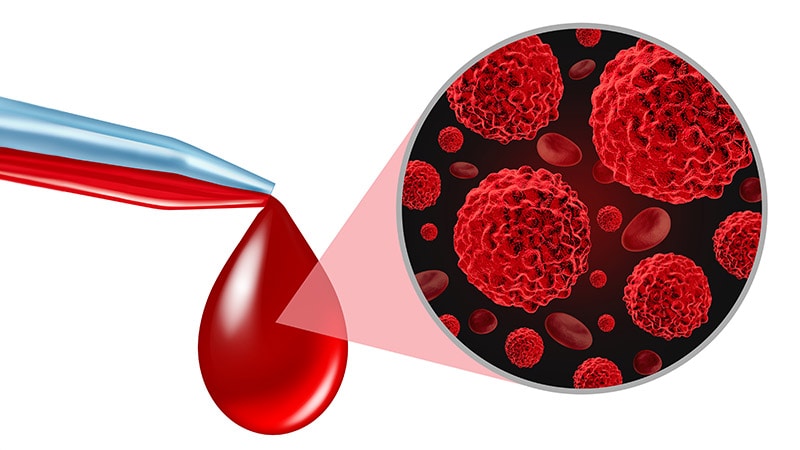Blood-Based Screening for Colorectal Cancer: Effectiveness and Limitations
Konsep Inti
Blood-based screening for colorectal cancer is not as effective or cost-effective as established methods like colonoscopy.
Abstrak
The content discusses the effectiveness and limitations of blood-based screening for colorectal cancer compared to traditional methods like colonoscopy. It includes insights from two modeling studies and an expert commentary.
Key Highlights:
- Blood tests detect circulating nucleotides associated with CRC.
- Studies analyzed effectiveness and cost-effectiveness of blood-based screening.
- Blood-based screening is not recommended to replace established methods.
- Blood tests may lead to more false positives and negatives.
- Cost-effectiveness and outcomes of blood-based screening were compared to FIT, stool DNA, and colonoscopy.
Structure:
- Introduction to Blood-Based Screening for CRC
- Expert Commentary on Blood-Based Tests
- Modeling Studies on Effectiveness and Cost-Effectiveness
- Comparing CRC Screening Methods
- Additional Considerations from AGA CRC Workshop Panel
Kustomisasi Ringkasan
Tulis Ulang dengan AI
Buat Sitasi
Terjemahkan Sumber
Ke Bahasa Lain
Buat Peta Pikiran
dari konten sumber
Kunjungi Sumber
www.medscape.com
Blood-Based Screening for CRC Promising but Lacks Efficacy
Statistik
"Without screening, the models predicted between 77 and 88 CRC cases and between 32 and 36 deaths per 1,000 individuals."
"Blood-based screening was considered cost-effective, with an additional cost of $25,600 to $43,700 per quality-adjusted life-year gained (QALYG)."
"A blood-based test at the CMS minimum reduced CRC incidence by 40% and CRC mortality by 52% versus no screening."
Kutipan
"High APL sensitivity, which can result in CRC prevention, should be a top priority for screening test developers."
"Unless we have the expectation of high sensitivity and specificity, blood-based colorectal cancer tests could lead to false positive and false negative results, which are both bad for patient outcomes."
Wawasan Utama Disaring Dari
by Carolyn Cris... pada www.medscape.com 03-27-2024
https://www.medscape.com/s/viewarticle/blood-based-screening-colorectal-cancer-promising-still-2024a10005uj
Pertanyaan yang Lebih Dalam
How can the industry improve the sensitivity and specificity of blood-based tests for CRC?
To enhance the sensitivity and specificity of blood-based tests for colorectal cancer (CRC), the industry can focus on several key areas. Firstly, investing in research and development to identify and validate specific biomarkers associated with CRC can significantly improve the accuracy of these tests. By targeting unique genetic or metabolic signatures linked to CRC, the sensitivity and specificity of blood-based tests can be enhanced.
Additionally, refining the technology used in detecting circulating nucleotides, such as cell-free DNA, can lead to more precise and reliable results. Improvements in sample collection, processing, and analysis methods can help reduce false positives and false negatives, thereby increasing the overall effectiveness of blood-based CRC screening.
Furthermore, collaboration between industry stakeholders, researchers, and regulatory bodies is essential to establish standardized guidelines and criteria for evaluating the performance of blood-based tests. By setting clear benchmarks for sensitivity, specificity, and cost-effectiveness, the industry can ensure that these tests meet rigorous standards and deliver accurate results for CRC detection.
What are the implications of false positive and false negative results in CRC screening?
False positive and false negative results in colorectal cancer (CRC) screening can have significant implications for patient outcomes and healthcare costs. False positive results may lead to unnecessary follow-up procedures, such as colonoscopies or biopsies, causing undue stress and anxiety for patients. Moreover, false positives can result in increased healthcare expenses and resource utilization, diverting resources from individuals who truly need them.
On the other hand, false negative results can be equally detrimental as they may provide a false sense of security to patients who actually have CRC or precancerous lesions. Delayed diagnosis due to false negatives can lead to the progression of the disease to advanced stages, reducing the chances of successful treatment and potentially increasing mortality rates.
Overall, false positive and false negative results in CRC screening underscore the importance of developing highly sensitive and specific screening methods to minimize the risks of misdiagnosis and ensure timely detection and treatment of colorectal cancer.
How can patient education be enhanced to ensure understanding of the limitations of blood-based tests for CRC?
Effective patient education is crucial in ensuring that individuals understand the limitations of blood-based tests for colorectal cancer (CRC) and make informed decisions about their screening options. Healthcare providers play a key role in educating patients about the benefits and drawbacks of different screening methods, including blood-based tests, to help them make informed choices.
One approach to enhancing patient education is through the use of clear and accessible communication strategies. Providing patients with easy-to-understand information about the accuracy, sensitivity, and specificity of blood-based tests, as well as their potential risks and benefits, can empower individuals to make informed decisions about their CRC screening.
Additionally, engaging patients in shared decision-making processes can help them weigh the pros and cons of blood-based tests against other screening options, such as colonoscopy or fecal tests. By involving patients in discussions about their preferences, values, and concerns, healthcare providers can tailor education efforts to address individual needs and ensure that patients have a comprehensive understanding of the limitations of blood-based tests for CRC.
Furthermore, leveraging digital health tools, such as online resources, interactive platforms, and educational videos, can enhance patient education and facilitate ongoing communication between patients and healthcare providers. By utilizing a combination of traditional and innovative educational approaches, healthcare professionals can effectively convey the complexities of CRC screening methods and empower patients to make well-informed decisions about their healthcare.
0
